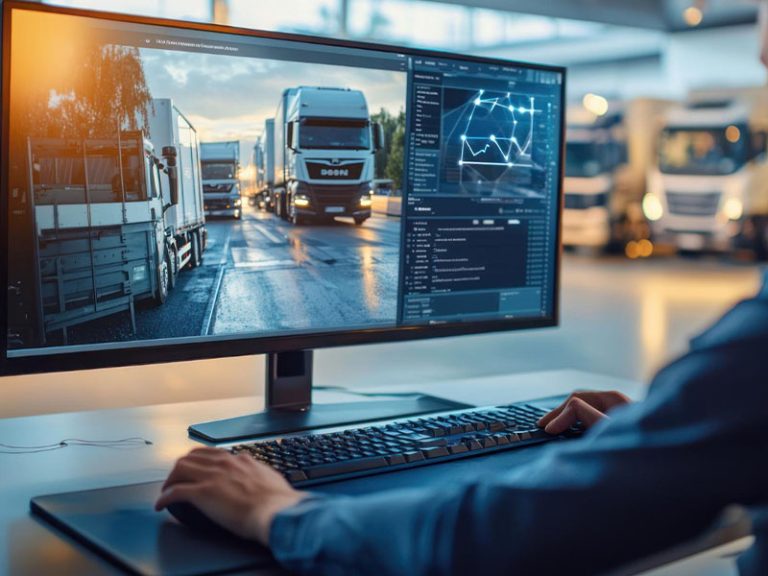Complete Guide on Fleet Management Software
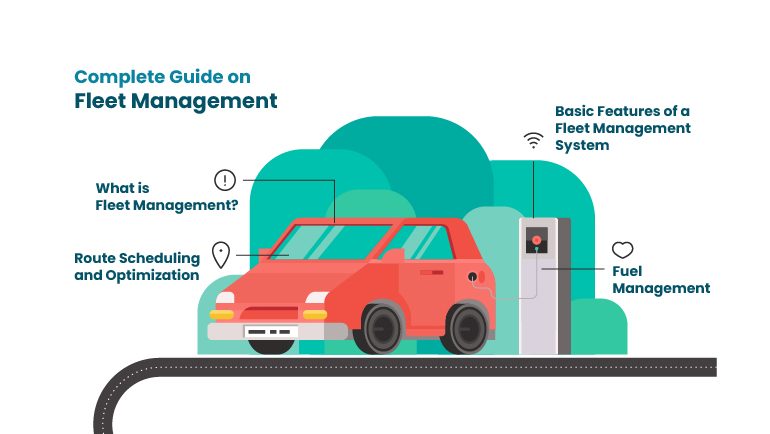
The Industrial Revolution has brought a new business mindset. It has changed everything from work ethics to operating methods. Nowadays, companies think of new ways to enhance their productivity. The fleet business also evolved with time. However, it missed an ultimate solution to its needs until fleet management software came along. These management solutions solved a lot of daily problems for businesses.
The concept of innovative telematics platforms was based on vehicle management. Their functionality was devised by considering the daily operations of a fleet. Nowadays, monitoring systems perform most of the managerial tasks, and that too with better efficiency. They not only save time but also improve a business’s productivity.
In this blog, we will delve into the various aspects of fleet management software in detail.
What is Fleet Management?
The process of managing and utilizing all the assets within a fleet effectively, from acquisition to disposal, is known as Fleet Management. Today, fleet management software in Dubai plays a vital role in handling this vast set of responsibilities, covering everything from vehicle monitoring and maintenance to advanced telematics. Fleet managers rely on modern digital tools and data-driven techniques to manage daily operations efficiently. As a result, there is no single fixed mechanism for managing a fleet, as requirements vary by business and industry.
What is the purpose of fleet management?
Any business that uses vehicles in its daily operations requires an effective management mechanism to handle the complete lifecycle of commercial vehicles. Vehicle Tracking Solutions UAE help businesses manage day-to-day fleet activities by improving productivity, reducing operational risks, and ensuring regulatory compliance. While modern vehicle tracking systems offer a wide range of capabilities, some of their most prominent functions are outlined below.
Vehicle Acquisition:
Vehicle acquisition is not a simple task. It involves several factors, like determining vehicle suitability, negotiating with manufacturers, and vehicle legislation like WLTP and RDE2. While selecting vehicles, you may also have to consider fuel efficiency, taxation, and insurance expenses. In addition to that, the budget is another integral aspect to look into before buying a vehicle. All these things demand an efficient management mechanism to get the job done effectively.
Fuel Management:
Preventing unnecessary expenses is the most significant objective of a fleet manager. Fuel costs make up a majority of operational expenditures, and keeping them low is a huge challenge. Many factors, like market rates and the country’s foreign policy, influence the fuel expense. Handling such aspects through management is impossible. However, the daily fueling expense is something that can be controlled through effective planning and monitoring.
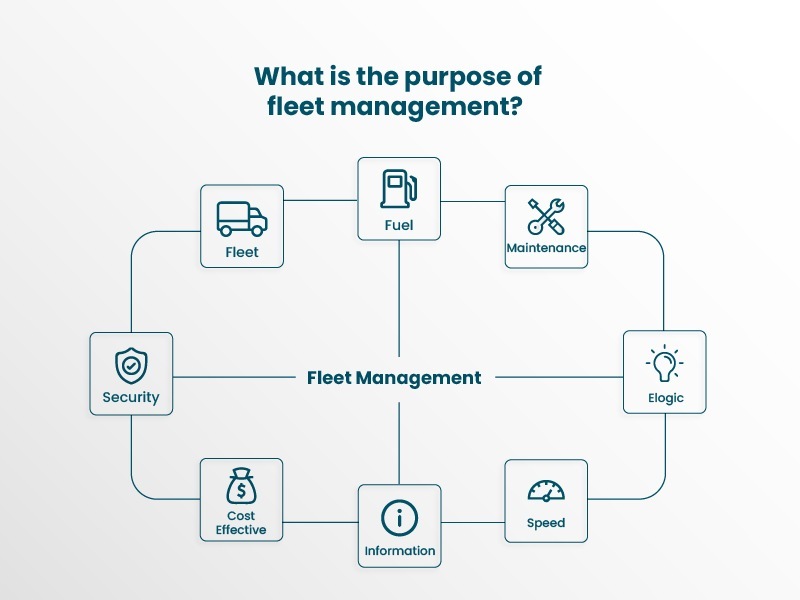
Effective fleet management helps managers ensure fuel efficiency. It is done by strictly monitoring the usage daily. The reporting is a crucial factor that keeps the drivers careful during their routine trips.
Real‑Time Monitoring & Reporting
Any vehicle that is not maintained correctly tends to wear out quickly. In the case of a large fleet, the maintenance job becomes doubly difficult. Without required maintenance, a company faces not only operational problems but also a financial burden. With the help of a foolproof maintenance mechanism, timely vehicle checks are essential to identify any technical faults that could prevent significant defects.
Safety:
The advancements in automobile technology have also increased the need for driver safety. Accidents are a big setback for companies. They both have financial and resource availability issues. Preventing them is a big challenge, as there is no fixed solution to this problem. However, an efficient vehicle tracking system can minimize the probability of crashes and theft through various measures.
The latest vehicle tracking systems employ cameras and sensors to keep an eye on the driver’s performance. Due to such constant accountability, the drivers remain fully vigilant while driving. In addition to that, with efficient fleet management, emergencies like accidents can be handled better. Insurance can cover repair expenses, and claims can be made much more efficiently.
Managing Compliance Requirements:
Compliance management is a big part of handling fleet operations. From daily inspection and driver checks to MOT’s, insurance, and reporting, many things need consideration. Documenting all such information can help in catering to any claims or investigations in a much better way. The vehicle legislation laws keep changing with time. It is essential to have a mechanism that keeps you updated about them to ensure hassle-free operations.
Cost-effectiveness:
If you talk about any business, reducing costs and expanding revenue is the ultimate goal. The managers keep on analyzing various aspects of their fleet to identify areas of improvement. They try to cut down unnecessary expenses without hurting the daily operations. The improved operational efficiency results in more productivity, which means a greater return on investment (ROI). Reducing fuel costs, maintaining vehicles’ efficiency, and analyzing performance all provide financial benefits.
Managing Information:
When a large number of vehicles are traveling daily, they generate a lot of data. Some of this data is useful for the business, while most of it is not. Managing this massive amount of information becomes a worry for managers. They have to filter the critical insights from unnecessary details, which takes significant time and effort. Advanced fleet management solutions offer an excellent way to organize and process this data efficiently.
The latest vehicle tracking and fleet analytics tools sort through information in no time. They also generate real-time operational reports based on the required data, helping managers devise successful business strategies. By saving data in a structured form, fleet performance monitoring systems ensure accurate analysis and better decision-making.
Performance Assessment:
Assessing the performance of the staff is a fundamental principle for success. Mostly, drivers are considered staff in fleet-related businesses. A significant purpose of managing the fleet is to monitor the progress of the workforce. From their attendance and working hours to driving performance, a good manager keeps an eye on everything. With strict monitoring, the employees tend to be more efficient, boosting the outcomes of the business.
In today’s business world, everything happens at a brisk pace. Time holds the key to daily work, and it is pivotal to success. While dealing with hectic routines on a daily basis, fleet managers tend to lose track of time. They can also get tired, resulting in lower productivity. To avoid these, real-time GPS tracking software for fleets provides an organized mechanism to perform tasks promptly.
Technology performs tasks much more quickly than humans. With the help of a management solution, there is natural automation in the routine. The managers can do every job in less time with a lot of convenience. As the latest systems are pretty foolproof, there are no loopholes that can result in time wastage.
What is fleet management software?
In this day and age, everything has become digital, and so has fleet management in the UAE. Nowadays, managers rely on advanced fleet management solutions and modern vehicle tracking platforms to monitor their fleets efficiently. Before going into further details, it is important to first understand what these systems are.
Digital fleet operations platforms in the UAE facilitate different aspects of fleet management across the region. They process, store, accumulate, monitor, and export operational data daily. The latest real-time vehicle tracking and monitoring systems used are advanced tools that cover every aspect of fleet operations, from live fleet tracking to performance and compliance management.
How does it work?
Modern vehicle tracking solutions work based on data integration. They use GPS tracking devices to trace the real-time location of the vehicles. In addition to that, many sensors are also used to fetch and transfer data. When the car moves or changes its status, the device records the data and transfers it to the central system. This way, real-time updates of the vehicle are provided.

The latest software combines GPS technology and Big Data Analytics to trace, store, and analyze data. They are gradually becoming more intelligent. With the introduction of AI (Artificial Intelligence), we can now predict. For this reason, many companies rely on a vehicle tracking system for strategy making.
A complete vehicle tracking system covers a lot of areas to facilitate companies in their daily operations. From live GPS tracking and vehicle maintenance to finance and telematics, the right solution caters to everything.
Essential Features of a Fleet Management System:
Although live vehicle tracking solutions come with a lot of features, the most important ones are as follows:
Asset Management:
Asset management is one of the most critical features of fleet management solutions. They allow the managers to handle their assets in a better way. By assets, we mean everything owned by the company, including vehicles, fuel, engine oil, etc.
The latest systems use sensors to gauge the usage of every asset. Some sensors provide a real-time reading of fuel consumption. Monitoring of the engine oil’s quantity is done regularly, and in case of renewal, the maintenance alerts are activated.
Efficient monitoring and accountability ensure that drivers drive carefully. The notification alerts can be set for various maintenance requirements as a reminder. Whenever there is a need for service, managers are informed promptly. Therefore, there is less wear and tear in the vehicle, preserving the fleet in good condition.
Fuel Management Features for Fleet Optimization
Excessive fuel consumption is a concern for every manager as it proves to be costly. With the help of tracking software, monitoring of fuel levels happens in real-time. The excessive usage of fuel while driving and leaks are detected through sensors. Every move of the driver, like harsh braking or speeding, is monitored. With route optimization, the designated paths are followed during trips, lowering fuel consumption.
Staff Management:
Managing a large force can be a stressful job for fleet managers. There is a lot of multitasking required, from gauging behavior to compiling reports. However, fleet management software features can perform all these jobs much more efficiently and quickly. Starting from managing drivers’ records to analyzing their daily KPIs, modern management solutions cover it all. Managers can also manage the staff’s daily attendance, work shifts, and off days. Efficient staff management helps distribute the workload between drivers. Managers can arrange shifts according to the circumstances by assessing the drivers’ availability. They can also set notification reminders for a shift’s ending time to prevent overtime for any driver. By doing so, all the drivers remain fresh during their working hours, contributing to their performance.
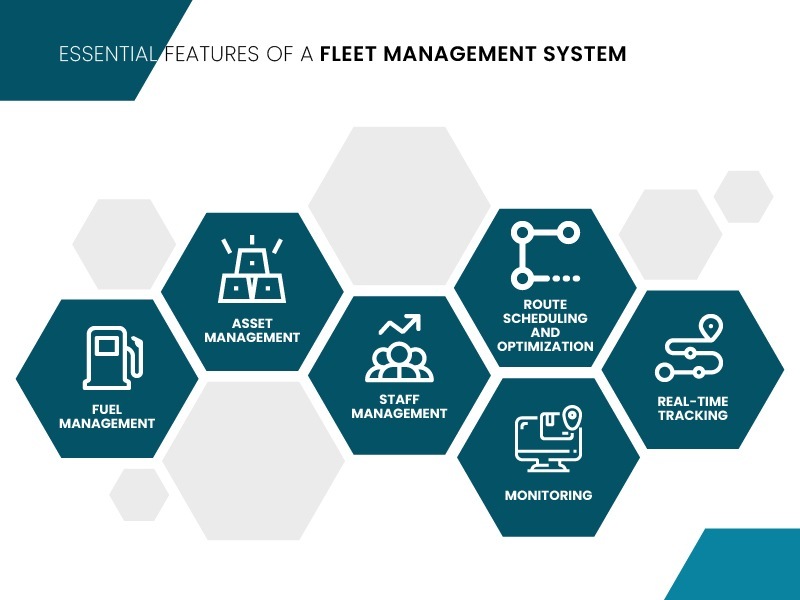
Route Scheduling and Optimization:
Managing the route allocation is a big task as it requires consideration of several aspects. For example, checking traffic situations, assessing drivers’ availability, and preventing overlapping of routes. It can be done conveniently with the route scheduling feature of a management platform. From assigning destinations to drivers to the allocation of routes, managers can perform everything.
Modern fleet management systems use predictive analytics to choose the optimized route for trips. The selection of the path is done considering all the hurdles on the road, from traffic to construction work. By doing so, the drivers reach their destination in less time. Therefore, more trips can be completed in a day. It also helps in preventing excessive fuel consumption during trips.
Real-Time Tracking:
It is a fleet manager’s dream to keep an eye on all the vehicles at once. Modern tracking solutions fulfill it by providing real-time GPS navigation. The location of every vehicle is known to the managers at every instant. The latest techniques, like geo-fencing, help detect the deviation, enhancing the accountability of drivers. Due to strict monitoring, the drivers tend to follow the designated routes.
With highly accurate and quick data transfer, managers can instantly detect any issues like vehicle breakdowns or accidents. The instant response can help in handling emergencies in a better way, minimizing the loss. Real-time tracking also proves helpful in making claims correctly in the case of a crash.
Monitoring:
The main job of a manager is to monitor all aspects of the daily fleet operations. Multitasking is a bit of a challenge and can be stressful. This job becomes a lot easier with the help of an efficient monitoring mechanism. From the location and status of the vehicles to staff performance, everything can be monitored. A centralized software provides a monitoring platform for managers to keep an eye on all areas of operations.
The latest telematics and tracking systems come with excellent reporting features. They provide comprehensive insights about every aspect, including fuel consumption, driver’s performance, daily trips, etc. The modern software also uses sensors to detect the vehicles’ status, like Engine status, movement status, etc. With such strict monitoring, there is minimal scope for inefficiency.
Benefits of using a fleet management system:
There are many benefits of using tracking and monitoring solutions, depending on the scope of the business. However, the biggest benefits of the Fleet Management System are given below:
Cost-Efficiency:
The management solutions facilitate the daily operations of a fleet. They cover everything from keeping track of the vehicles’ location to staff performance analysis. When everything works in an organized way, productivity increases, resulting in more return on investment (ROI). In addition to that, efficient route planning and driver accountability also help in controlling the fueling cost.
Many other expenses are also cut down through tracking solutions. The timely service of the vehicles reduces the overall maintenance costs. Strict monitoring of drivers prevents accidents, and efficient driving keeps the overall health of the vehicles.
Hassle-free Operations:
The latest tracking platforms have made life easy for managers. These solutions have taken over many managerial tasks. With technology on board, there is a lower probability of errors, improving overall operational efficiency.
The faster and more effective communication channels help avoid routine hiccups like permission requests. Modern telematics solutions are equipped with real-time communication features. They offer a constant connection between the drivers and the manager. It ensures a quick response to every request.
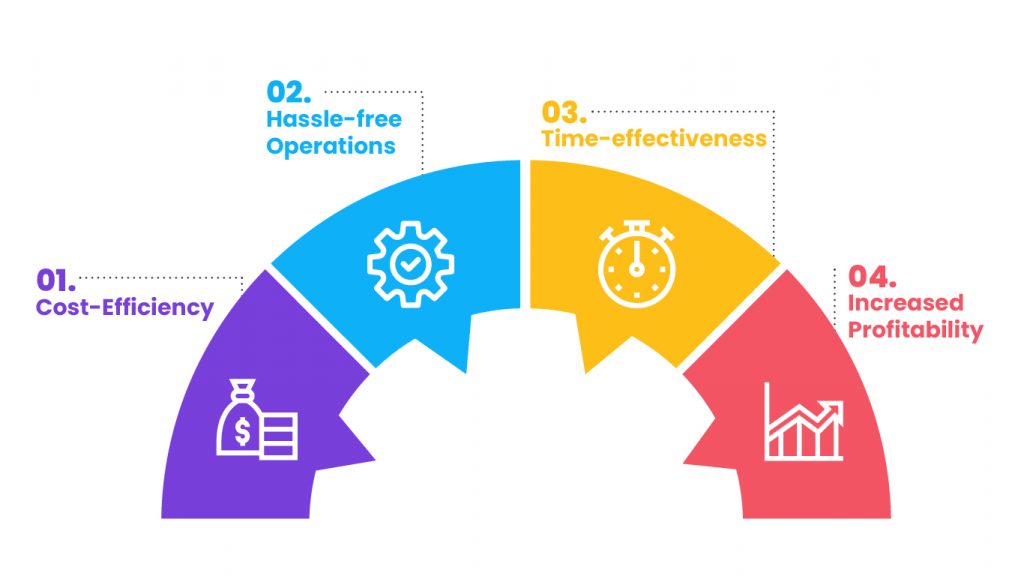
Time-effectiveness:
In today’s business world, everything happens at a brisk pace. Time holds the key to daily work, and its importance is pivotal to success. While dealing with hectic routines on a daily basis, fleet managers tend to lose track of time. They can also get tired, resulting in lower productivity. To prevent all these things, GPS tracking systems provide an organized mechanism to perform tasks in a timely.
Technology performs tasks much more quickly than humans. So, there is natural automation in the routine for managers. They can get the job done much faster with a lot of convenience. As the latest systems are pretty foolproof, there are no loopholes that can result in a waste of time.
Increased Profitability:
Fleet businesses have recorded tremendous success with the introduction of telematics software. There has been a considerable increase in their ROI and overall profitability. The main reason behind this is that these solutions help businesses cut down costs and enhance output. With automation in daily operations, tasks are done more efficiently and quickly. It results in a better outcome regularly, resulting in overall profitability.
Monitoring every aspect of the business helps identify the weak areas. With management solutions, the managers can rectify the shortcomings in the process. It helps improve profitability by making operations more efficient and reliable. A more organized mechanism with minimum errors is profitable in every way.
Things to consider before choosing a fleet management system:
Nowadays, there are a variety of vehicle tracking solutions available in the market. There is no fixed rule to determine an ideal choice, as the needs of every business are different. However, one should consider some aspects before making a selection. Some of them are given below:
Understand your requirements:
Before looking for software, you should be clear about your requirements. The fleet dynamics are different from one another, depending on the scope of the business. If a solution works out for a company, it does not mean that it will work for everyone.
It is essential to understand that fleet problems also vary from business to business. You should identify the issues for which you want maintenance software. After identifying the problems, find a system that solves them effectively. For example, businesses with excessive fuel consumption should choose a system with a focus on diagnostics.
Reliability and Sustainability:
Reliability is an important thing to consider before choosing any product, and the same is true with tracking solutions. You cannot just rely on fa system’s features; checking its user experience is also essential in determining its effectiveness. Choose software that has a user-friendly interface and operates smoothly without crashing.
A practical solution is sustainable for a longer duration. It means that software should have a flexible enough design to accommodate the changing needs of the fleet. To ensure that, taking trials and demos of the system before the selection is the best practice.
Privacy and Security:
The monitoring software has a lot of valuable data regarding a company’s operations. A breach of security can prove to be very costly for the business. To avoid such things, the privacy and security of the software should be foolproof. There should not be any loopholes that present a hacking risk. Consider the privacy of your information as a priority before making a choice.
As the topic of cybersecurity is pretty technical, it requires professional help. It is advisable to hire a cybersecurity specialist to assess the privacy and security conditions of the software.
Pricing:
Regardless of the size of the business, pricing matters to everyone. Therefore, it is essential to ensure that the price of the software is within your comfort zone. The pricing should be gauged according to the effectiveness of the system. Some solutions charge a significant amount of money but offer high quality as well. It means that they provide a good return on investment (ROI), which is always profitable.
A company should analyze the output software is providing. If a cheap system is not meeting your goals, there is no point in having it. The maintenance and support costs of substandard systems also exceed those of quality ones.
Availability of Upgrades:
The field of telematics is continuously evolving with the introduction of new practices over time. If a system has a rigid design with no room for improvement, it cannot be considered ideal. Therefore, it is essential to check the flexibility of the system to adjust to changing requirements. You can inquire from the software manufacturer whether they have a vision of the future in mind or not. If they provide regular upgrades to make the system adaptable to the changing needs, go for it.
Latest Trends of Fleet Management:
The growing needs of businesses have pushed manufacturers to come up with more advanced systems. They are adopting innovative practices according to the changing requirements in the market. Let us look at some of the leading developments in the telematics industry.
Expansion of 5G technology:
A few years back, 5G technology was considered a hypothetical term with no link to reality. But in the last year, it has materialized and is available in many parts of the world. 5G technology is not just an update of 4G, but it has revolutionized the internet’s scope. It has a speed 100 times faster than 4G with the capability of generating greater bandwidths. With a much speedier data transfer, companies can boost their productivity a lot.
The 5G networks also allow more device connections compared to 4 G. For this reason, the scope of monitoring can reach a whole new level. Multitasking can become much easier for businesses, and every aspect of vehicle maintenance and security can be improved.
Introduction of autonomous vehicles:
A huge advancement in the telematics industry is the introduction of autonomous vehicles (AVs). AV vehicles are those that have self-driving ability and require little or no human help while driving. This innovation is set to make groundbreaking changes to the scope of the telematics industry. It will maximize the operational speed to help companies save time. The efficiency of the operations will also improve with the removal of human errors. The AV vehicles can connect to many devices on a virtual cloud with compact data integration. Data at every fraction of a second can be shared with the monitoring platform, making life easy
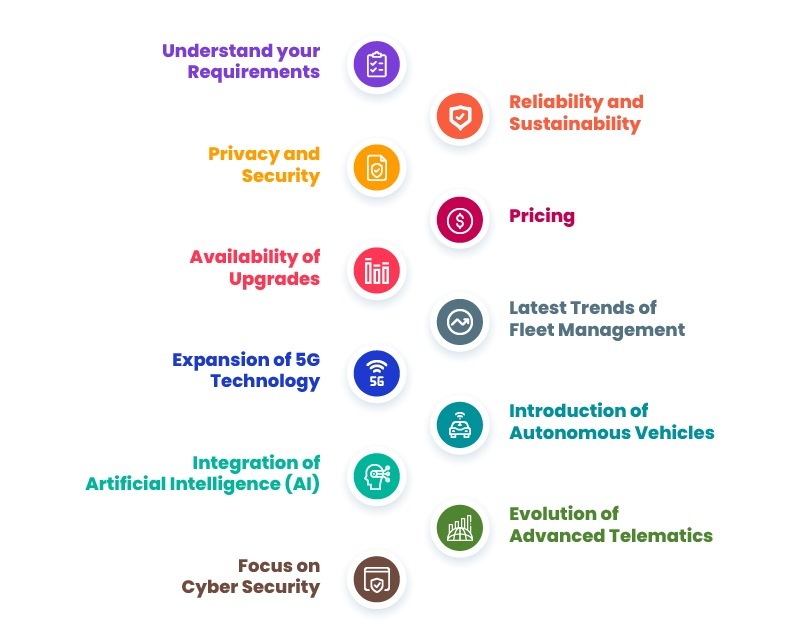
Integration of Artificial Intelligence (AI):
One big problem that comes with autonomous vehicles is that they do not have a brain like humans. They do not have cognitive thinking ability and cannot make the right decisions instantly based on the given circumstances. However, the introduction of Artificial Intelligence (AI) has solved this problem to a great extent. The future vehicles will be able to identify and self-diagnose real-time issues just like humans.
As driving efficiency increases with advancements in AV technology, AI integration will help in minimizing accidents. By considering these aspects, the future of vehicle security looks very bright.
Evolution of Advanced Telematics:
Advanced telematics innovations have changed the scope of digital fleet management platforms in the UAE. They are no longer just tracking and management tools. With the integration of the latest communication technologies, modern vehicle monitoring solutions have become the lifeline of fleet operations. Equipped with a communication port and a black box, drivers can talk directly to managers, allowing them to convey issues in real time and receive instant solutions.
The latest sensors have become a lot more efficient and accurate. They can detect any subtle reading and transfer it to the main system. For this reason, the fleet managers get maximum awareness of the real-time scenario of the vehicle’s trip. The companies can also integrate different systems, like accounting, fuel cards, and data automation, with the tracking software. These can help in facilitating daily operations and improving productivity with an efficient data-sharing mechanism.
Focus on Cyber Security:
Monitoring solutions generate a large amount of data daily. Some of it is useful, while much is unnecessary. Some companies also integrate other systems, such as financial software, into the central platform. For this reason, digital fleet management platforms may contain highly sensitive information, including account details and operational data. Securing this information is essential to prevent hacking and other cyber threats. That is why businesses focus on making their vehicle tracking and fleet analytics systems impenetrable.
Manufacturers offer cybersecurity tools for fleet management solutions to protect sensitive information. With these tools and proper firewall configurations, advanced fleet operations platforms have become much more secure. They can quickly identify and neutralize any attempts at unauthorized access. Innovators continue striving to achieve the highest level of security for fleet management systems, making digital fleet software more effective and trustworthy.
Future of Fleet Management:
Telematics technology is evolving every day. Innovations are happening to enhance the functionality of tracking solutions. With the expansion of features, the scope of these systems is also increasing. More businesses are deploying them to facilitate their operations, with ride-hailing and rental companies on top. The booming telematics industry seems to have a bright future considering its growing demand.
Final Thoughts
Fleet management software in the UAE has become a necessity for modern businesses locally and globally. As fleet operations grow more complex, companies require tools that deliver transparency, automation, and data-driven decision-making. A powerful digital fleet operations platform not only simplifies daily operations but also improves safety, reduces fuel expenses, enhances productivity, and ensures compliance with regulatory standards.
FAQs
1. What is fleet management software?
White Label Fleet management software is a digital platform that helps businesses monitor, track, and manage their vehicles in real time. It centralizes data such as GPS location, fuel usage, driver behavior, routes, and maintenance schedules to ensure efficient fleet operations.
2. How does fleet management software work?
It works by using GPS trackers, telematics devices, and sensors installed in vehicles. These devices collect data and send it to a cloud-based dashboard where fleet managers can view locations, vehicle health, alerts, driver activity, and performance insights.
3. What are the key features of fleet management software?
Popular features include real-time GPS tracking, fuel monitoring, route optimization, driver behavior analysis, vehicle maintenance scheduling, geofencing, automated reporting, and safety alerts. Some systems also offer compliance tools and mobile apps.
4. Why is fleet important for businesses?
Fleet Management software helps reduce costs, improve efficiency, increase safety, enhance customer service, and ensure compliance with regional regulations. Companies can eliminate manual processes, prevent fuel misuse, reduce downtime, and boost fleet productivity.
5. How does fleet software help reduce fuel costs?
It tracks fuel usage, idle time, harsh driving, and inefficient routes. Managers can identify fuel wastage patterns, switch to optimized routes, and receive alerts for unusual fuel consumption, leading to significant cost savings.


